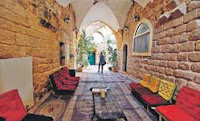HOLY LAND
Town fuses biblical sites with vibrant, at times deafening, modernity

An inn in Nazareth.

Arab Israeli Abu Ashraf pouring batter for circular pastries called kataif at his restaurant.
When Pope Benedict XVI visits Nazareth today, the town where Jesus grew up, he will bring brief attention to a Holy Land destination that is at once world famous and unjustly overlooked.
Like the tour groups bused into Nazareth for lightning visits on their way to somewhere else, the Pope will see the Basilica of the Annunciation, on the site where Christian tradition says an angel told Mary she would bear the child of God.

The Church of the Annunciation is one of Christianity's holiest sites. AFP
Like most visitors, the Pope likely won't have the chance to savour the shabby Ottoman chic of the Old City or eat too many of Abu Ashraf's honey-drenched pastries. It's safe to assume he will not experience the ear-splitting repertoire of Chaos, Israel's only Arab heavy metal band.
Pope Benedict XVI will celebrate Mass with thousands of worshippers on a nearby hillside. He comes amid a modest but energetic renaissance here, one that has seen new restaurants opening up and signs of vitality in the neglected alleyways of the Old City. Those willing to go beyond the city's holy sites and shops hawking olivewood crosses will discover the ideal place to experience Arab life in northern Israel and a base for exploring the rest of the Galilee.
A new hiking route, the Jesus Trail, leads trekkers from Nazareth to Kafr Kana, where Jesus is believed to have turned water into wine, and on to other holy sites.
If hiking through Galilee hills sounds too strenuous, simply ask directions through the bazaar to Abu Ashraf's place while discarding any attachment you may have to healthy eating. Abu Ashraf Abu Ahmad can be found pouring batter or laying out circular pastries called "kataif" on a table facing the street.
Don't bother asking how they're made: The recipe is so secret, Abu Ashraf claims, that even his wife has no idea what it is. An outsider can only observe him stuffing batter with nuts and soaking it all in honey. The result is as good as it sounds and will provide the sustenance necessary to keep cruising the bazaar.
As you do, you might meet Hatem Mahroum, 30, who was Israel's welterweight boxing champion. He runs two shops here in the market and claims Nazareth's spinach is the best in the world. Or you might stop in at the Fahoum coffee store, where the smell of coffee beans and cardamom is overpowering and where the proprietor might subject you to a litany of complaints about how the city has neglected its old market in favour of the new Western-style shopping malls on the outskirts of town.
For a peek into Nazareth's ancient history, it turns out the place to visit is not a museum but a gift shop. The store, Cactus, became an archaeological site accidentally, when its owners undertook a renovation in the early 1990s and discovered an immense Roman bathhouse from the time of Jesus.
Martina and Elias Shama have since incorporated the ruins into their shop, and visitors can go to the arched basement where slaves stoked the fires that heated the rooms above. Ceramic pipes installed by ancient plumbers are still visible in the walls.
The bathhouse has helped revise the accepted view of what Nazareth was at the time of Jesus: A town with a grand public bath would have been a large urban centre, not the poor backwater of popular imagination.
A taste of the younger Nazareth scene can be had not far away at Dandana, opened in 2006 by Fadi Saba, 31, and his twin brothers, Shadi and Rami, 27. Dandana serves European-style food and alcohol, and some nights the Sabas push the tables aside, bring in a DJ, crank up the Arabic pop music and dance.
The Sabas say they are well-enough known around town that Nazareth daughters put them on the phone to calm parents worried about curfew infractions. "We tell the parents 'don't worry, they're in good hands'," Fadi Saba said.
At the bar, the brothers said, you might meet local celebrities like soccer players or the members of Chaos, Nazareth's contribution to Israel's heavy metal scene. The band's MySpace page says the group started as "four friends from Nazareth" and identifies its style as "melodic death metal".
There's no better place in northern Israel to spend an evening, Saba said, but acknowledged word was slow getting out.
"Take someone from New York or from Germany, and they'll only know Nazareth from the Bible — they think people over here are still riding donkeys," he said. AP
From TODAY, Traveller – Thursday, 14-May-2009
![Reblog this post [with Zemanta]](http://img.zemanta.com/reblog_e.png?x-id=3329bd77-8009-4c65-9ab0-41a57ab41ff7)
No comments:
Post a Comment